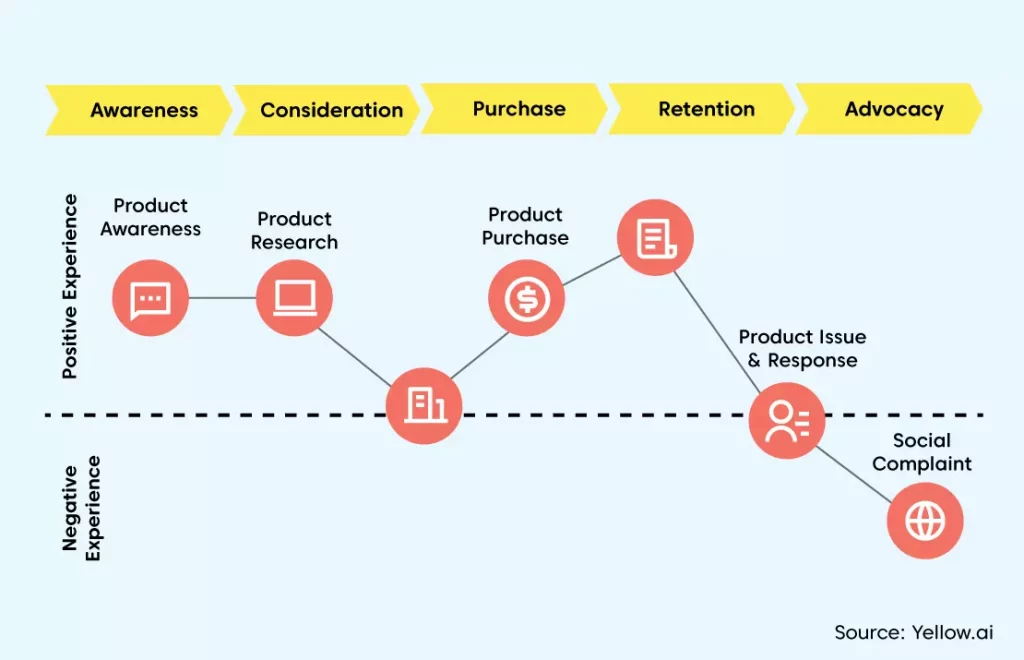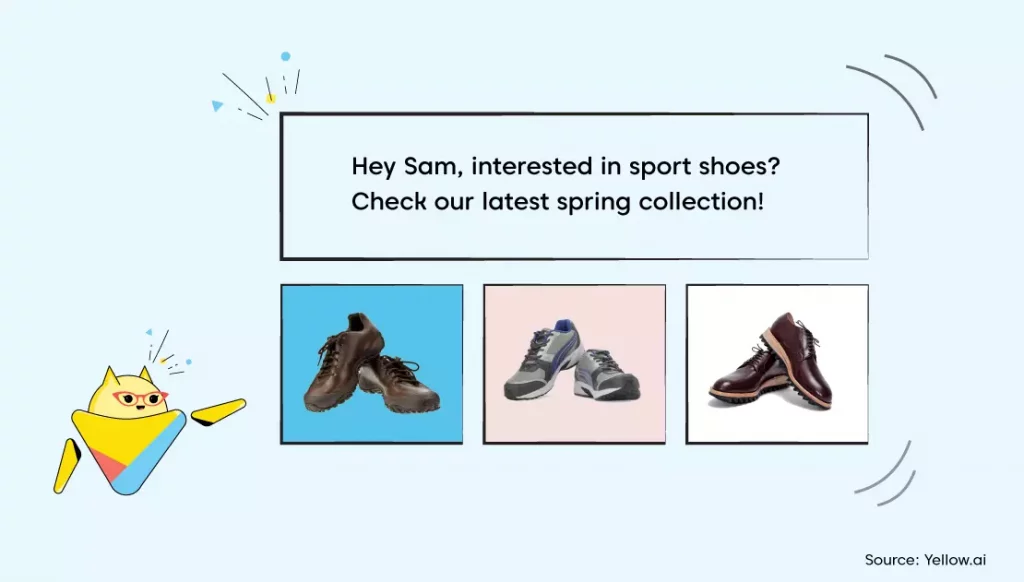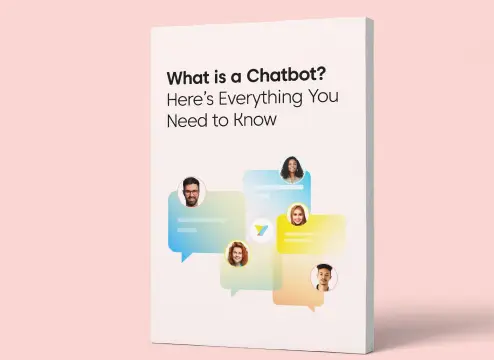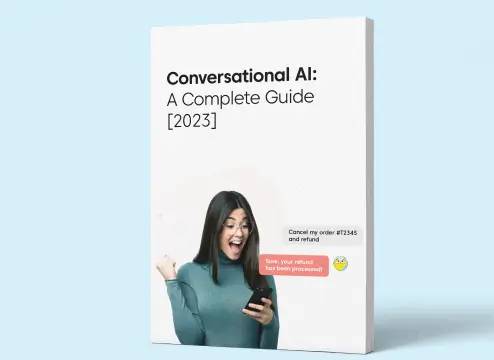Chatbots are driving the interaction engine in an era of relationship marketing. Conversational marketing requires stakeholders to connect, listen and deliver in order to build trust between a brand and a customer. It enables enterprises to understand clientele better and anticipate their demands for customized solutions. In this article, we’ll delve deeper into what conversational marketing is and various use cases of chatbots in marketing.
What is a chatbot?
Chatbots are AI-powered CX automation tools that help businesses streamline client engagement operations and expand their engagement capacity. Intelligent chatbots use a pre-programmed sequence of behaviors or rules to replicate human-like interactions.
If the use case and overall configuration are sound, a chatbot can save enterprises time, human resources and money. Modern chatbots are programmed to perform routine interactions with natural language processing and AI to automate routine communication processes.
What is conversational marketing and where does it fit in your marketing strategy?
Conversational marketing is a CRM technique that involves using chatbots and voice assistants to communicate with customers. Consumers can reach out to the brand when browsing a brand’s website, social media or paid ads at various contact points. This strategy aids in attracting more prospects, understanding their needs and moving them through the sales funnel quicker.
Chatbot marketing, similarly, is a sales-generating marketing method that uses computer programs to automate conversations with prospective customers on the website or the app. Chatbot marketing enables businesses to qualify and engage with leads 24*7*365. Chatbots can initiate conversations with website visitors, evaluate prospects and even upsell to consumers besides addressing routine support queries.

What are the marketing applications of chatbots?
Chatbots can handle marketing in a variety of ways and from various angles. A chatbot might come in helpful if you want to improve your conversational marketing strategy.
The most prevalent use cases of chatbots in marketing are:
1. Generate new prospects
Chatbots are ideal for making a memorable first impression on potential clients. For example, a chatbot hosted on Facebook can target visitors to the brand’s Facebook profile. Similarly, the bot can start a dialogue to attract new clients and direct them to the brands’ website. Continued conversation can turn a browser into a lead and further to a paying client.
2. Engage with customers
Another successful conversational marketing approach is encouraging prospects, leads and current customers to engage with your brand. Users converse with chatbots as though they are conversing casually with a friend.

Businesses can provide customers with personalized experiences based on their preferences, interests and inclinations by paying close attention to these interactions. As a result, the consumer feels more connected to the brand and is more likely to identify with it.
3. Move customers down the funnel
Consumers today don’t have time to waste; they value quick and effective services. Consider programming your FAQs into a chatbot, an efficient interactive technique. It provides your website visitors with a pleasant onboarding experience.
Instead of letting the FAQ languish somewhere in the customer support section, consider compiling a list of the most frequently asked questions and programming the bot to respond to them. This will help customers quickly move ahead in the conversation funnel.
4. Identify up-sell and cross-sell opportunities
Chatbots adapt and learn in real-time to understand customer preferences. Chatbots can gather preliminary research about a potential customer and then use it to send valuable upsell or cross-sell product recommendations with greater ease.
5. Promote and push personalized offers
Yes, bots can assist in the promotion of products. You can program an automatic chatbot message to start conversations with a browser when they visit the website. If you have a new product line or want to promote something specific, you can program the chatbot to recommend the same.
6. Build specific conversation funnels
All leads begin at the top of the funnel and as they learn more about your business, they move further and get closer to purchasing your product or service. This process is called a funnel.
Now, when you introduce conversation to the whole process with the help of tools such as chatbots, that interact with customers and help them move ahead in their journey, it is known as a conversation funnel. You can determine your ideal buyer’s journey and use it to create a conversation funnel for directing the customers to complete a goal.
How to implement a conversational marketing strategy?
1. Determine viability
Evaluate and determine whether introducing a conversational marketing strategy can make a substantial difference. Are you looking ahead to improve users’ experience when they need assistance or do you want to speed up the client journey down the sales funnel.
2. Identify customer requirements
If you want to have a dialogue with your users, you need to know what language and dialect they use, what they’re trying to accomplish and how you can meet their needs.
3. Evaluate devices, platforms and distribution channels
You can begin by evaluating devices, platforms and channels once you’ve figured out who your audience is and what your goals are. Are you attempting to enhance your client service? Is it common for your users to contact you by cell phone? Do you already have a social media following? Do you want to boost your website’s conversion rate?
An AI chatbot can help you boost the pace of your funnel by directing people to the material they require.
4. Test and iterate
Run simulated conversation sessions in an ideation workshop to develop scripts as if you were having an actual discussion with your users. This will assist you in anchoring your script in user-friendly language and capturing unforeseen dialogue pathways.
You can also utilize this phase and process to define your brand’s tone and voice when engaging in a discussion.
Dos and don’ts of chatbot marketing
When it comes to chatbot marketing, it’s crucial to remember that there are still a few dos and don’ts to keep in mind. Even while it’s an effective and powerful technique, it still necessitates some effort on the part of your marketing team or agency.
1. Maintain a balance
First and foremost, don’t let bots take over your marketing campaigns entirely. There must be a human element to a strategy in order for it to be successful. While automation can be incredibly beneficial, it cannot be the sole mode of communication.
It is crucial to remember that chatbot marketing isn’t a “set it and forget it” strategy. You can have bots initiate the discussion that leads to a person or your staff checking in on a regular basis to ensure the bots are performing their job properly.
2. Don’t go overboard
While utilizing your chatbot as a conversational marketing tool, you don’t want to go overboard. Remember that it’s a fantastic tool to message customers directly and is quite valuable. If you send too many communications to your audience, they will unsubscribe and will not want to be spammed by your company.
3. Measure results
You can not forget about chatbots. You need to monitor their performance by analyzing key marketing metrics such as ROI, response rate, leads generated and conversion rate to measure your chatbot’s effectiveness.

Conclusion
We live in a digital age where competition is fierce and customers’ purchasing decisions are entirely based on their experience. Customer expectations are skyrocketing and organizations are finding it increasingly difficult to meet them on a consistent basis. Human efforts alone will not be enough to provide a smooth user experience.
Chatbots have come a long way from being a foreign technology to becoming an integral part of people’s daily lives. Chatbots have seen a lot of success and several businesses use them effectively in conversational marketing. Chatbots are essential elements for enterprises to be future-ready.
Connect with our experts to know more about how our next-gen conversational virtual assistants can power your marketing campaigns to achieve greater heights.


















